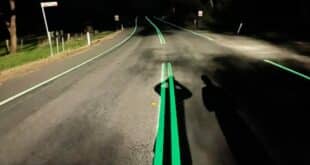DGT Spain reminds drivers to be safe when traffic lights fail during a power outage.
Credit : IZZ HAZEL, Shutterstock
In response to the recent power cuts that have been making headlines across Spain, The General Directorate of Traffic is offering some important guidance.
If the lights go out — quite literally — and traffic lights stop working, knowing how to behave at intersections becomes crucial. In total blackouts there is no room for error.
What to do when traffic lights stop working during a power outage in Spain
It’s not free for all when there is a power failure and the traffic lights stop flashing. According to DGT, drivers must follow a strict order of priorities to ensure safety.
At the top of the list are traffic officers — police or civil guards on the scene. When they are present, and are directing traffic, their instructions take precedence over all other signs, lights, or markings. Why? They react in real-time, and adapt to the changing situation. If you see an officer in a traffic junction, ignore the rules and just follow them.
Temporary signals like flashing lights or detour signage are next. Temporary signs may be used for roadworks, public events or other temporary situations. They should be obeyed just as closely as permanent ones.
Third in the hierarchy are the traffic lights themselves — but if they’re off due to a blackout, you simply skip them and look to the next level down: vertical road signs, such as ‘Stop’, ‘Give way’, or priority intersection signs.
If none of those are present either, drivers should pay attention to road markings — painted lines, arrows, and zebra crossings. They may not be at the top of the list but they are still very important in the absence other road markings.
What to do when there are no road signs or traffic signals in Spain
Here’s where it can get complicated. If there are no lights working, no vertical signage, and no markings visible, the general rule is to give way to cars approaching on your right.
This is a basic rule that must be followed at intersections where there are neither signs nor signals to give an advantage. It’s simple — but not always obvious when everyone’s unsure. DGT recommends that you slow down, stay alert and only cross the road when it is absolutely safe.
There are some exceptions to the rule. The vehicle on the road with paving has priority if the road without paving is unpaved. Also, if a tram or train line crosses the junction, it always has right of way — regardless of direction or visibility.
Safety tips for DGT drivers in a blackout
Driving in a blackout isn’t just about knowing the rules — it’s about staying calm and using common sense. Here are some key tips from DGT:
- Slow down. You need more time to react when there is less visibility or confusion on the roads. Slower speeds = fewer surprises.
- Keep your distance. Allow extra distance between your vehicle and the one in front. If the power goes out, you cannot rely on brakes or smooth movements.
- Keep your focus. It’s not time to look at your phone or play with your radio. Eyes on the road, hands on the wheel — distractions can wait.
- Keep calm. Panic is not the answer. Blackouts can be stressful. Take a deep breathe, drive defensively and trust that the other drivers (hopefully!) are doing the same.
Knowing Spain’s traffic rules is essential for safety during a blackout
Yes, power outages are annoying. But on the roads, they can also be dangerous — especially when signals fail and chaos creeps in. DGT encourages all drivers in Spain, to review these priorities so that they are prepared and confident to take action if the light suddenly goes out.
Because the next time traffic lights stop working, it won’t just be a technical issue — it could be a life-or-death moment. How can you handle this situation? Stay alert, know the rules and drive safely.
The latest news and updates from Spain
 Costa News Spain Breaking News | English News in Spain.
Costa News Spain Breaking News | English News in Spain.






